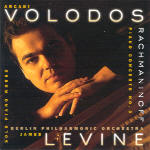Russian piano phenomenon Arcadi Volodos gave a lovely performance of this concerto a couple of seasons ago with the Concertgebouw Orchestra, and I only wish he had recorded the work with that group. As it stands, this outing reminds me of the scene in Bananas when Woody Allen (disguised as a Latin American dictator) reveals his true identity to Louise Lasser just after making love to her, and she says, “I knew there was something missing.” That “something” lies squarely with the conductor and orchestra. It’s not just that the recorded balances place Volodos too far forward. Well, that’s part of the problem, particularly in those many first movement passages where the solo accompanies the orchestra, rather than the other way around (the almost inaudible cellos when they get the opening tune right at the beginning offer one telling instance).
But more to the point, what’s missing, simply put, is that feeling of give and take between soloist and conductor that this most symphonic of concertos demands. Volodos lets fly fistfuls of notes, taking the first movement’s cadenza in stride (he plays the big one, though the smaller of the two makes better musical sense), and turning in a remarkably coherent account of the finale–no mean achievement. But he’s working in a vacuum. Whenever James Levine and his band take over, the result sounds correct, but glacial. This isn’t an easy criticism to quantify, but it’s true nonetheless. Where, for example, is the warmth in the violins’ descending sighs at the beginning of the slow movement? Or the rhythmic kick behind the same movement’s wittily impulsive central waltz episode? What’s the point of the finale’s overly tame brass, and orchestral playing just before the concluding second subject apotheosis that offers speed but such blurred articulation that you can hardly hear definite notes?
In short, with nothing to offset Volodos’ brilliant pianism, the work comes across as a kind of monstrous etude: cold, calculated, steely, and mechanical. The encores are all wonderfully done, but that’s not really the point. Levine and the orchestra contribute little positive to the performance, and Volodos is not the kind of risk-taking genius, like Argerich for example, who can leave the orchestra in the dust and have the audience thanking her (and them) for the experience. Still, this should have been a major musical statement. The elements are clearly in place, but in the event they fail to add up to much more than frustration.
































